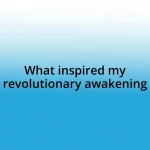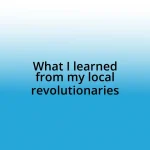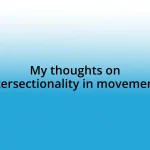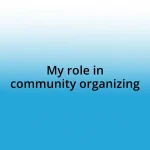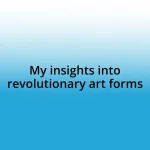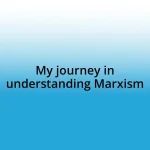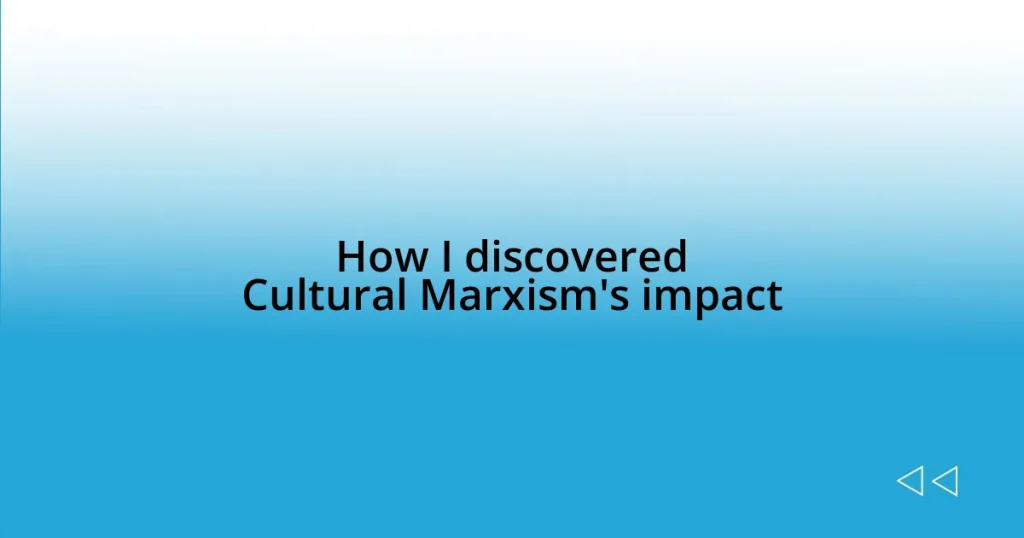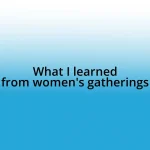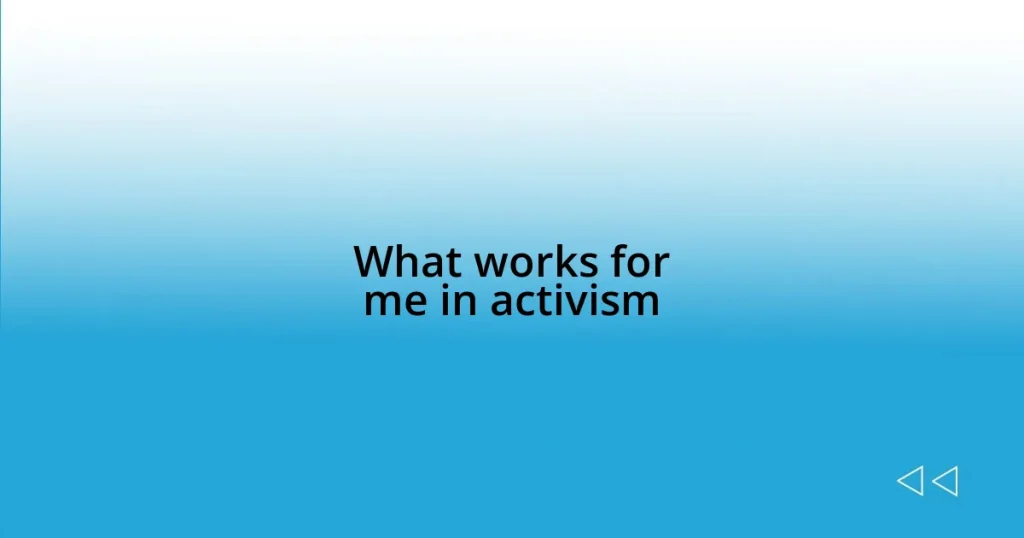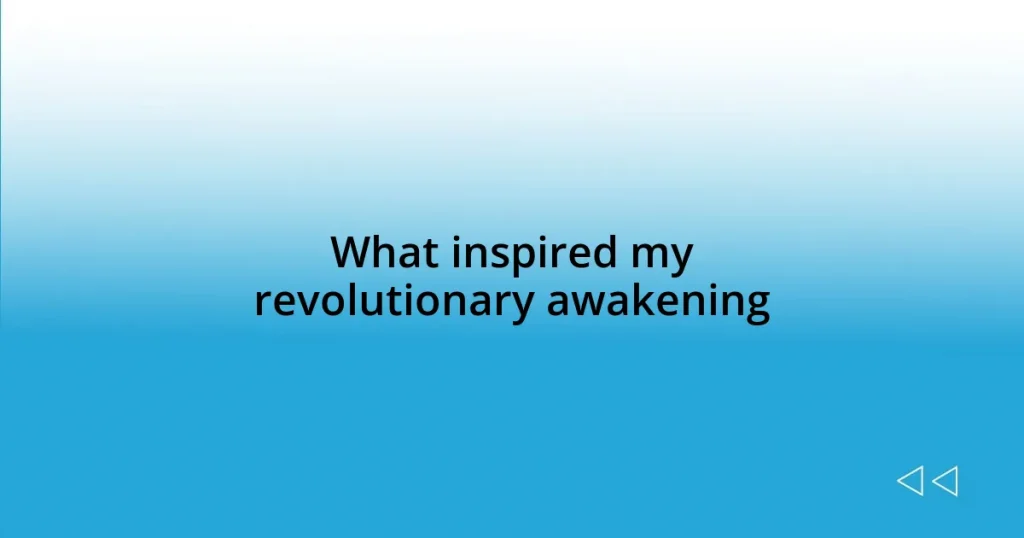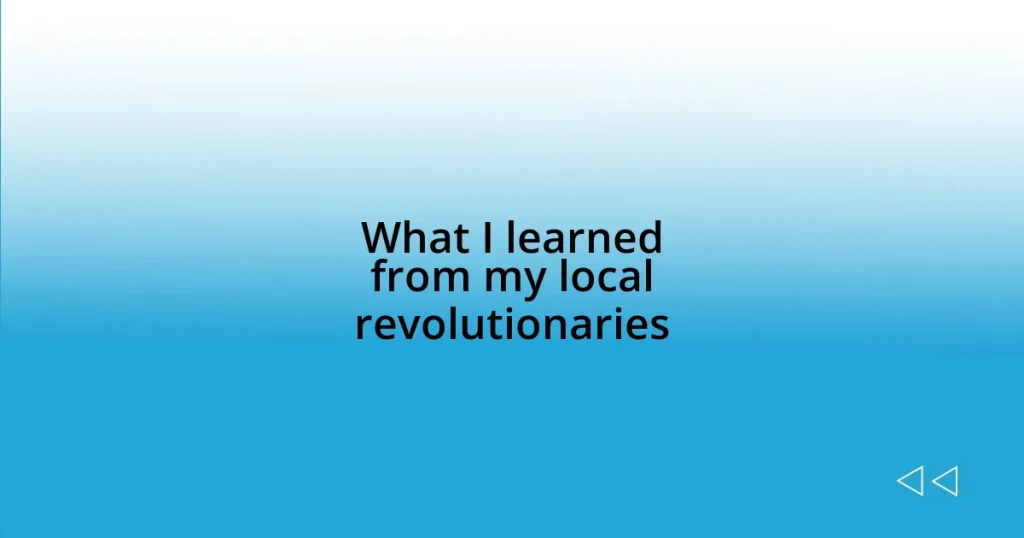Key takeaways:
- Cultural Marxism shapes our societal norms and conversations, often creating divisiveness and stifling open dialogue.
- Its origins trace back to the Frankfurt School, which critiques capitalism and highlights the interplay between culture and power dynamics.
- The influence of Cultural Marxism extends into education, media, and politics, often leading to a conformist environment that limits diverse perspectives.
- Addressing the challenges posed by Cultural Marxism requires fostering open dialogue and critically evaluating the narratives presented in media and society.
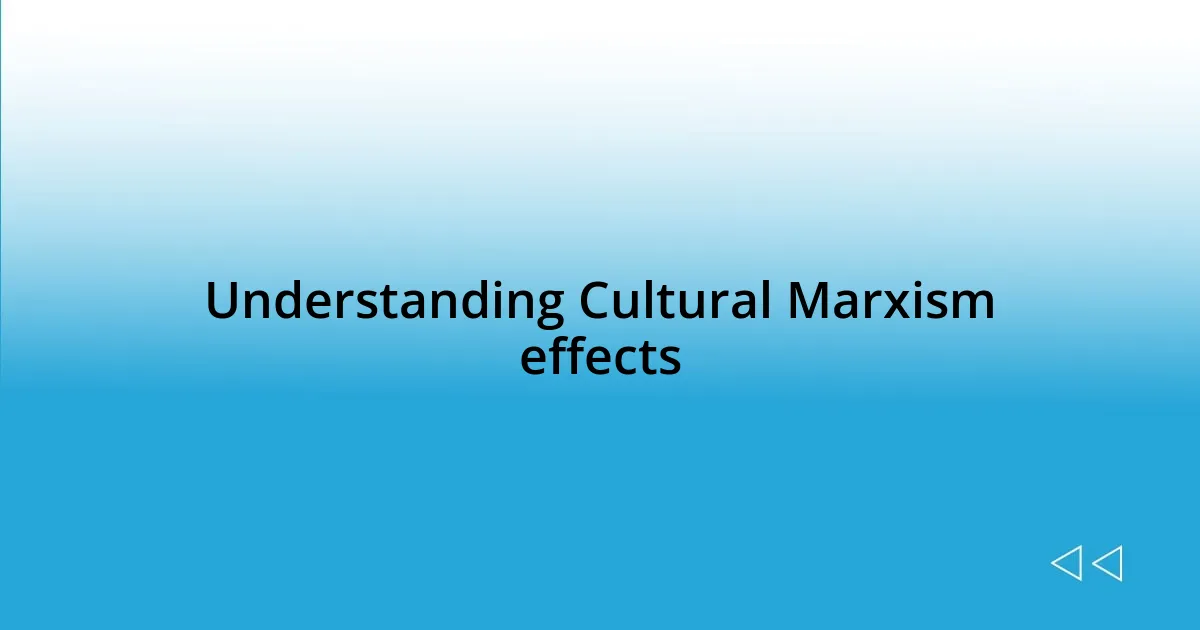
Understanding Cultural Marxism effects
Cultural Marxism subtly shapes our everyday interactions and influences the narratives we encounter, often without us realizing it. I remember a discussion with friends that devolved into a heated debate about identity and politics, which made me reflect on how deeply rooted these ideas are in our culture. It struck me how the constructs we often take for granted can splinter relationships and create divisiveness in our society.
When I witnessed a local community event skewed heavily toward one ideological perspective, I felt a mix of frustration and sadness. It left me wondering: how did we arrive at a point where open dialogue becomes secondary to dominant narratives? Looking back, I see that this polarization isn’t just an isolated incident but rather symptomatic of a broader Cultural Marxism influence.
Navigating the effects of Cultural Marxism often feels like walking a minefield of sensitivities, and I’ve found myself questioning my own beliefs more than ever. I couldn’t help but wonder why some ideas resonate while others spark immediate backlash. This quest for understanding sometimes leaves me feeling bewildered, but it’s through these challenging conversations that I uncover the intricate layers of influence shaping our collective consciousness.
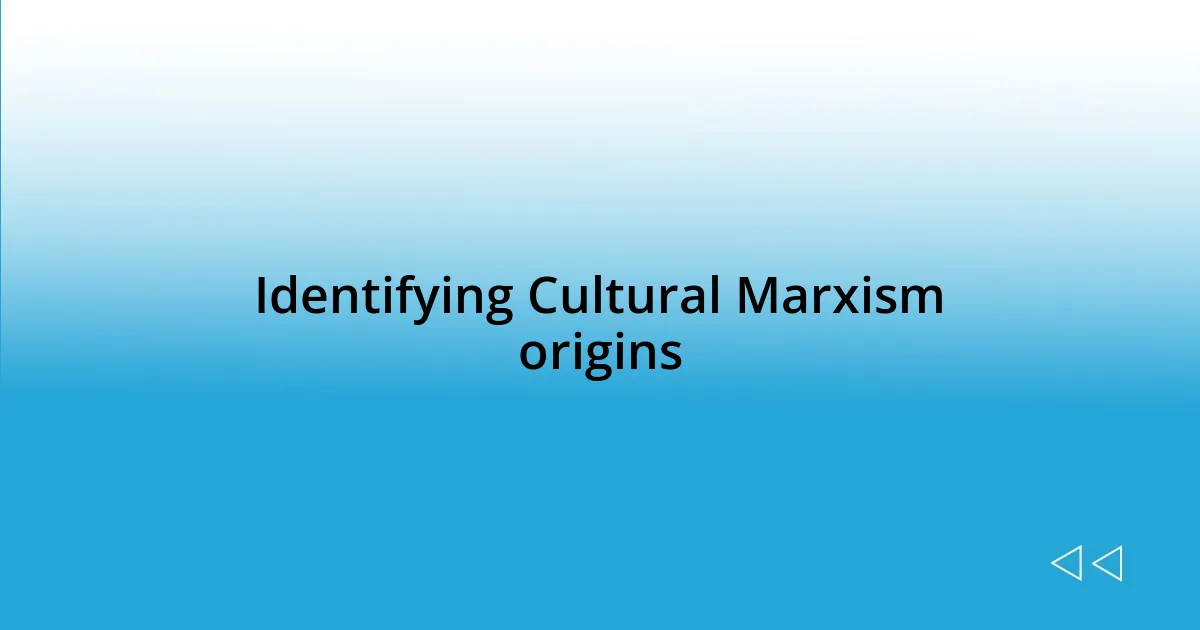
Identifying Cultural Marxism origins
When I began exploring Cultural Marxism, I wanted to trace its roots back to its ideological beginnings. I soon learned that it emerged from the Frankfurt School in the early 20th century, aimed at critiquing capitalist society and understanding how culture influences power dynamics. This historical context was eye-opening; it illuminated how academic theories can trickle down and manifest in everyday life, shaping societal norms and values in ways that often go unnoticed.
To help clarify these origins, here are some key points that stand out:
- Frankfurt School Foundations: Founded by thinkers like Max Horkheimer and Theodor Adorno in the 1920s, focusing on culture and society.
- Critical Theory Development: Aimed to analyze and critique society’s structures, especially capitalism, and its cultural implications.
- Influence on Social Movements: Their ideas laid the groundwork for various social movements, echoing themes in contemporary discussions on race, gender, and identity.
- Legacy in Academia: These concepts infiltrated universities, fostering a new generation of thinkers who reshaped cultural dialogue and norms.
- Modern-Day Impact: Today, Cultural Marxism often appears in debates about political correctness, identity politics, and cultural diversity.
Reflecting on this research, I recalled attending a lecture at my university where a professor discussed these ideas. The way he linked historical movements to current issues resonated with me, shifting my perception of seemingly independent social discussions. It was a revelation, watching how academic theories breed real-world consequences. And that’s when it hit me: there’s profound complexity in what we deem “norms,” and recognizing these origins is the first step toward understanding their pervasive influence.
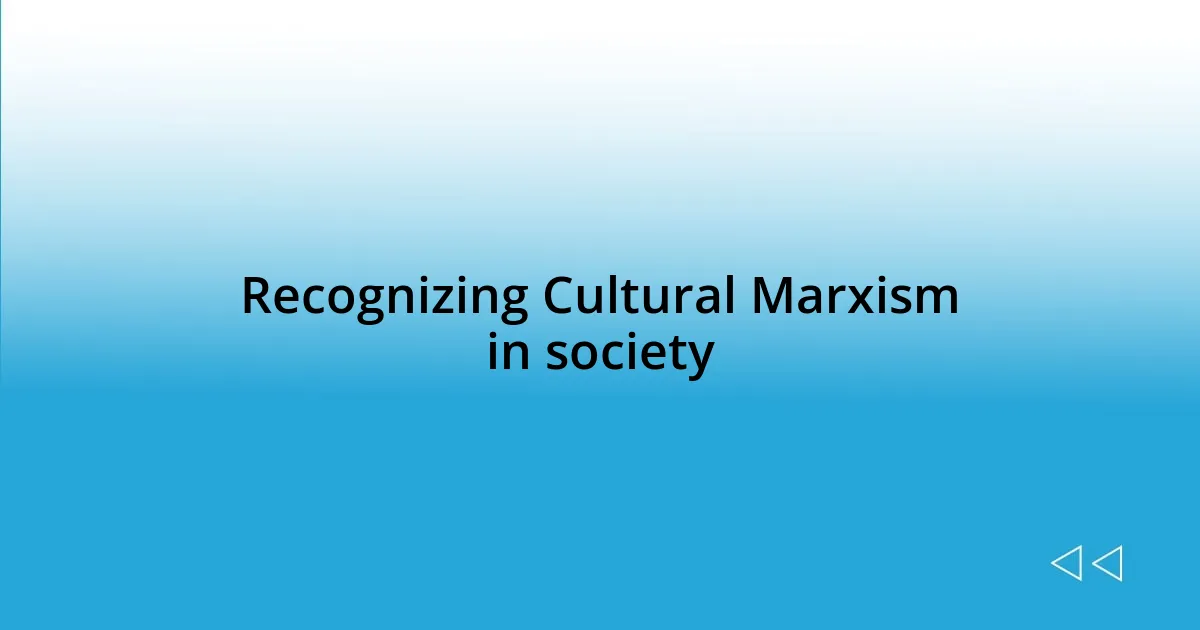
Recognizing Cultural Marxism in society
Recognizing Cultural Marxism in our society isn’t always straightforward. I remember attending a dialogue workshop where the facilitator nudged us to consider how our views were shaped not just by our experiences but by cultural narratives. The moment the discussion turned towards identity labels, I sensed an undercurrent of conflict. It was captivating yet alarming; I hadn’t realized that shared language could also be a tool for division, reflecting that Cultural Marxism often thrives in environments where dialogue is stifled or dominated by particular ideologies.
At a gathering of friends, one comment about art and politics led to unexpected tensions. Some friends championed a more ideologically pure perspective while others felt squeezed into silence. I couldn’t help but wonder: what causes this divide? It dawned on me that Cultural Marxism doesn’t just influence the art or politics we consume; it seeps into our relationships and social dynamics, compelling us to navigate interactions more cautiously. This experience strengthened my resolve to challenge dominant narratives, guiding me towards more inclusive dialogues.
When I first analyzed media content around me, I was surprised to see how consistently certain themes recurred—often framed in a way that aligned with progressive ideals. A documentary I watched, while shedding light on important social issues, left me pondering the underlying biases it might perpetuate. It made me realize that recognizing Cultural Marxism requires nuanced thinking; we need to critically engage with content and question the broader implications behind the narratives we encounter.
| Aspects of Cultural Marxism | Examples from Society |
|---|---|
| Reshaping Language | Terms like “privilege” or “oppression” often dominate discourse, modifying how we communicate sensitive issues. |
| Polarizing Dialogues | Conversations on social media often devolve into echo chambers, stifling diverse perspectives. |
| Art and Identity Politics | Art often reflects a single viewpoint, limiting the representation of varied ideologies. |
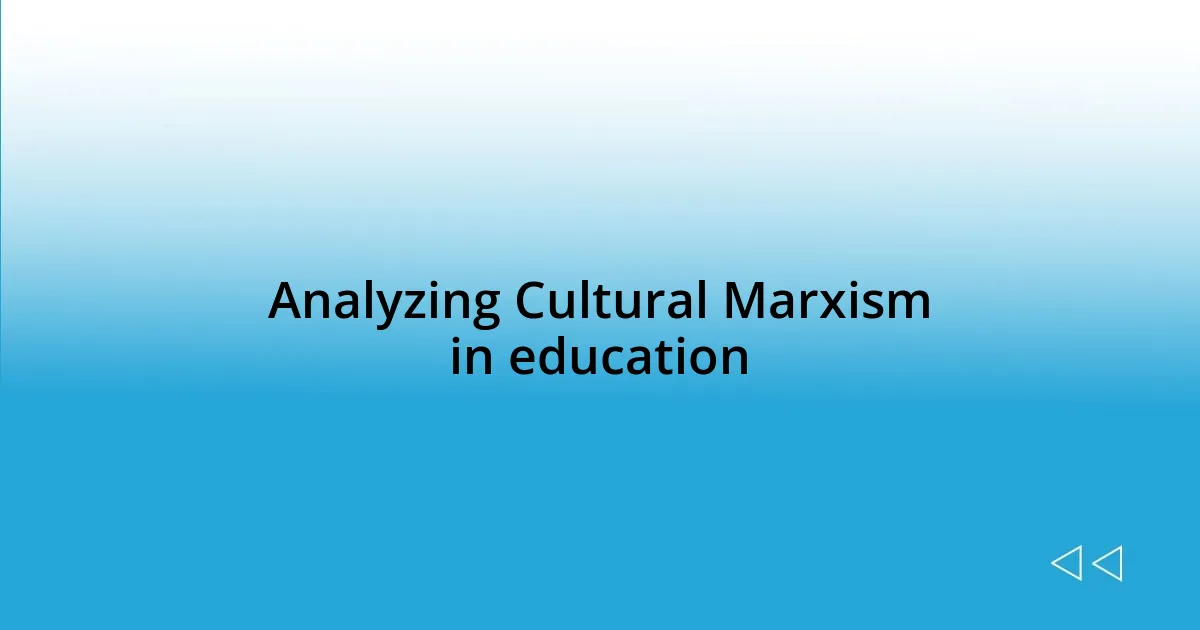
Analyzing Cultural Marxism in education
Cultural Marxism’s impact on education can be profound, often molding the framework through which students view the world. I recall walking through my college campus and overhearing a lively debate about the syllabus of a diversity course. The passionate arguments made me wonder: how much do these courses genuinely reflect the complexity of our society versus pushing a singular narrative? It felt like an unspoken rule that opposing viewpoints were unwelcome, underscoring a trend I’ve seen across numerous institutions.
In my own classroom experiences, I felt the subtle shift in discussions when topics like capitalism and socialism arose. I noticed a hesitance among some classmates to express divergent opinions, almost as if they feared social repercussions. This scenario made me realize how Cultural Marxism can create an environment of conformity, where the fear of being labeled as “wrong” stifles intellectual exploration. How can true learning occur if students aren’t encouraged to question and debate? I believe robust dialogue is essential for fostering critical thinking, yet I often found that conversations were guided more by ideological commitment than by curiosity.
When I volunteered in tutoring programs, I observed teachers subtly weaving Cultural Marxist themes into lesson plans, often emphasizing societal victimization narratives. While these discussions address important issues, I couldn’t help but feel they sometimes overshadowed personal agency and resilience. For instance, a lesson on poverty focused predominantly on systemic barriers, but omitted stories of individuals who thrived despite them. This imbalance piqued my interest: how do we ensure that educational content fosters empowerment instead of fostering a mindset of defeat? Balancing these perspectives remains a challenge I see manifesting in classrooms across our educational landscape.
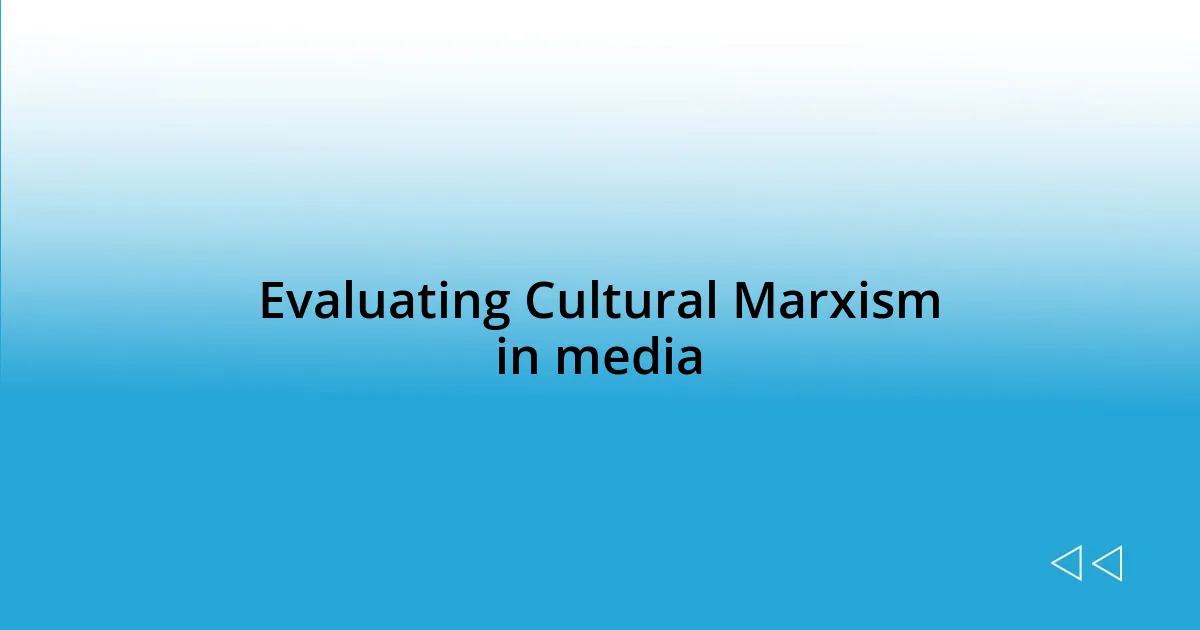
Evaluating Cultural Marxism in media
When I started critically evaluating media, I couldn’t help but notice patterns that felt undeniably entrenched in Cultural Marxism. I remember flipping through channels, and, rather than simply enjoying a show, I began to analyze how the characters were portrayed and what messages were subtly woven into the narrative. For example, a popular series featuring a diverse cast seemed progressive on the surface, yet it consistently framed certain ideologies in a way that made me question: whose stories are being told, and whose are being silenced?
During a recent binge-watch session, I found myself reflecting on a movie that initially captivated me with its cinematography and plot. Yet, the more I thought about it, the more I realized how its underlying messages often echoed Cultural Marxist themes without offering a balanced perspective. How often do we consume content that resonates with our beliefs but overlooks complexity? This thought lingered, potentially reshaping how I approach future media choices, as I strive to discern not just what I enjoy, but also why it resonates with me.
Moreover, scrolling through social media feeds, I’ve observed how easily narratives can spiral into echo chambers. I experienced this firsthand when I participated in an online discussion about a trending topic, only to witness a divergence between those who dared challenge the prevailing sentiment and those who aligned with it. It made me wonder: are we truly embracing diverse viewpoints, or are we merely creating another layer of conformity masked as acceptance? This realization highlighted the need for critical engagement with media; it becomes crucial to not just absorb the content but actively question the ideologies presented, fostering a more nuanced understanding of the world around us.
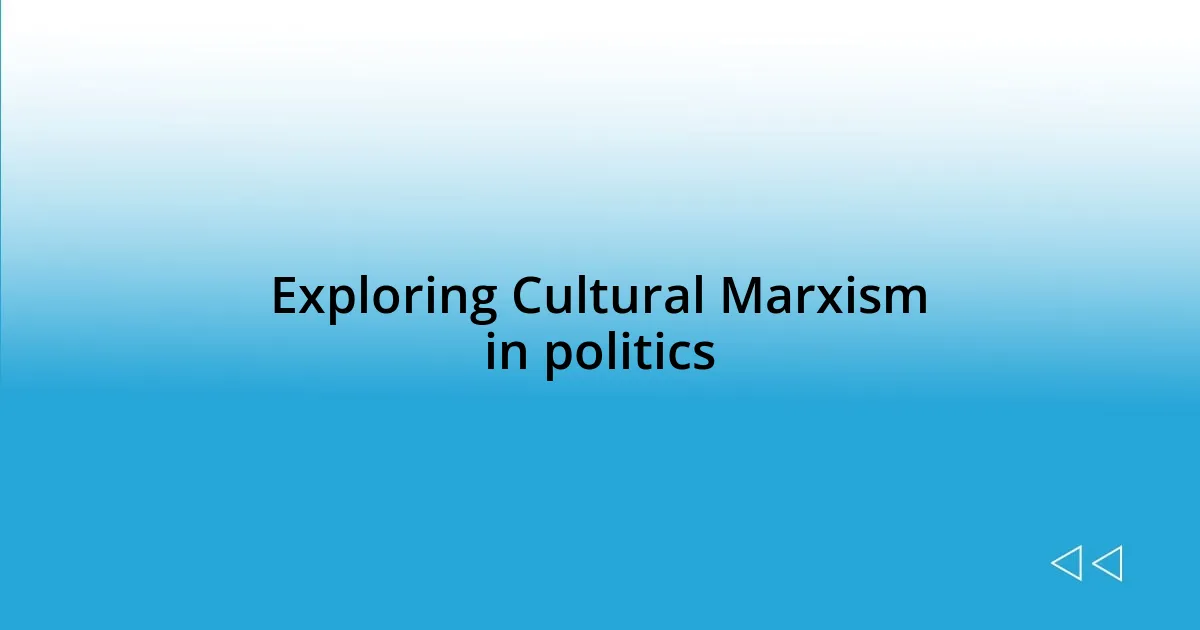
Exploring Cultural Marxism in politics
In the realm of politics, I’ve often encountered discussions that reflect the core tenets of Cultural Marxism, particularly around identity and power dynamics. I recall attending a local political meeting where the conversation overwhelmingly centered on issues like privilege and systemic oppression. It struck me how the language used often polarized the attendees, turning what could have been a healthy debate into an “us versus them” mentality. I found myself asking: how can we build unity when discourse focuses on division?
As I delved deeper into political campaigns, I noticed a recurring theme: candidates would leverage Cultural Marxist ideas to connect with specific demographics. I remember watching a candidate’s speech that emphasized social justice in a way that resonated with many, yet simultaneously, it felt dismissive of those who might advocate for traditional values. This approach made me reflect: are we truly fostering inclusivity, or are we merely reshaping the narrative to fit a specific ideology? The impact of such strategies can have far-reaching effects on how policies are crafted and understood.
I’ve also seen activism influenced by these ideas, pushing for changes that often overlook broader societal implications. I once participated in a rally that aimed to address climate change, yet I couldn’t help but notice how many speeches emphasized collective guilt rather than shared responsibility and innovation. It left me pondering: is the goal to enact real change or to reinforce a particular worldview? These moments have fundamentally shaped my understanding of how Cultural Marxism permeates political conversations, raising questions about the balance between advocacy and dialogue.
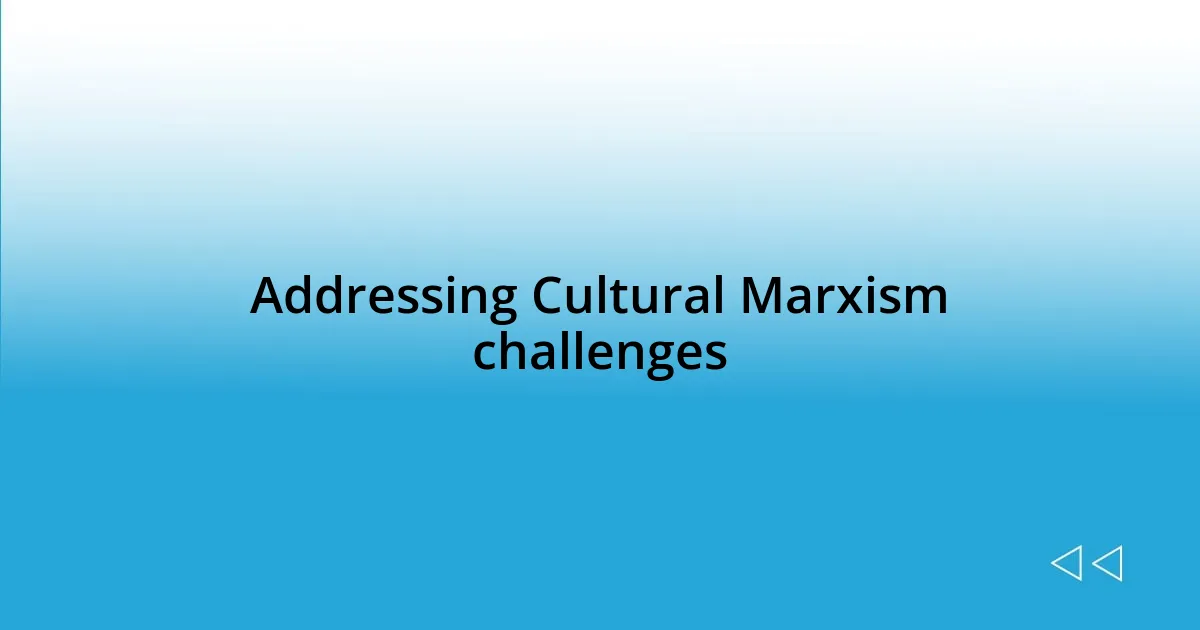
Addressing Cultural Marxism challenges
Addressing the challenges posed by Cultural Marxism requires a deeper understanding of the narratives at play. I remember attending a workshop aimed at dissecting social ideologies where the facilitator urged us to analyze our own biases. It made me realize how difficult it can be to navigate conversations about identity without falling into the traps laid by these ideologies, particularly when our emotions are tied to our beliefs. How do we engage in these delicate discussions without feeling defensive or isolated?
When faced with Cultural Marxism’s influence in our communities, it’s essential to foster open dialogue. Reflecting on a debate I observed at a local community center, the passionate arguments often seemed to overshadow the potential for genuine understanding. I couldn’t help but wonder: how do we create a space that encourages varying views without descending into chaos? It’s crucial for us to actively listen and seek common ground, rather than merely reinforcing our own perspectives.
Moreover, confronting Cultural Marxism challenges also means reassessing our media consumption. I vividly recall a time when I decided to watch a documentary that promised a balanced view but ultimately fell short, skewing facts to support its agenda. This experience prompted me to ask: how much are we losing when our sources of information lean heavily in one direction? It’s a reminder that the pursuit of truth in our media choices is integral to understanding the complexities of our society.


